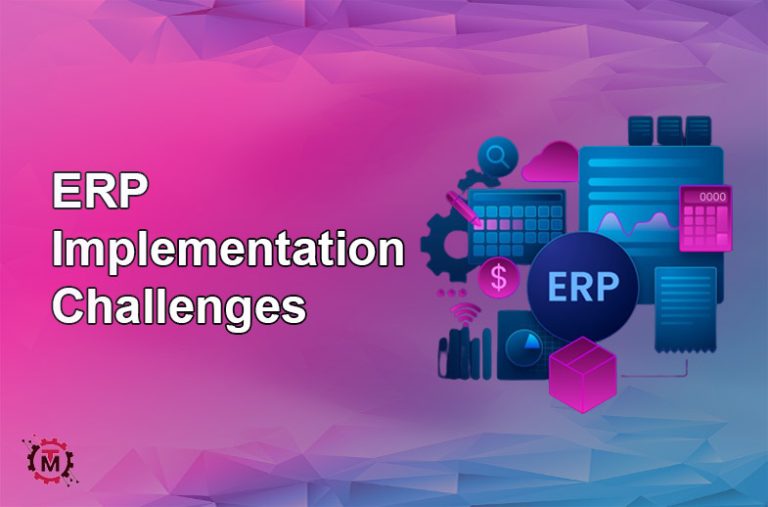ERP (Enterprise Resource Management) implementation is one of the most important and equally difficult processes of running a business. That is because there are a lot of things going around in a business and managing them all at once in the most beneficial way is difficult.
In that process, companies face a lot of challenges that can hinder their productivity to a great extent. In today’s blog, we are going to discuss such ERP implementation challenges that most companies face in a comprehensive way.
So, let’s start.
What is ERP Implementation?
ERP implementation is a multifaceted endeavor that involves plenty of business processes, data migration, software management, and the training of users to embrace ERP software and its components.
Businesses should conscientiously assess their requirements, evaluate existing processes, review past business records, and outline expectations to select the most suitable system.
A well-designed implementation strategy and thorough preparation are indispensable for the effective rollout of an ERP system.
ERP Implementation Challanges
Below, we provide an overview of the prevalent ERP implementation challenges that companies should consider for successful integration:
Data Management
Successful ERP implementation involves various phases, such as discovery and planning, design, development, data migration, testing, deployment, and support, all of which demand meticulous project management and active involvement from all team members. Businesses can attain ERP implementation success by fostering effective teamwork, adhering to timelines, and maintaining open communication.
Inadequate project management poses a risk to ERP adoption, as it often results in delegating the project to whoever is available without proper oversight from those in charge. Failing to manage ERP functions can lead to missed opportunities in automating operations, enhancing functionality, leveraging industry-specific capabilities, and achieving additional objectives.
Integration with Data and Processes
ERP provides the entire organization access to a dependable data source, and the data migration phase is paramount during installation. Inadequate data integration stands out as the most prevalent challenge in ERP implementation, cited by experts as accounting for up to one-fifth of the most common issues. Subpar data migration can result in erroneous data and create complications when updating live inventory.
Careful planning is pivotal in keeping the entire ERP implementation project on track and within budget. The integration of existing systems and workflow with an ERP solution ensures that all data throughout the organization originates from a single source, thus reducing the time spent assembling data from disparate locations.
Management of Changes
Implementing an ERP system involves transitioning between various software applications to enhance the efficiency of business operations and bolster security. However, this transition can introduce challenges related to change management, requiring individuals to adapt their mindsets and daily work routines.
Resistance to these changes can disrupt workflow and business outcomes. To ensure a successful implementation, securing the early support of leadership and stakeholders is crucial. If the team aligns with the core principles and significance of the ERP system, it can positively affect the organization.
To facilitate the acceptance of the new ERP system, employees should undergo comprehensive training and receive support, allowing them to communicate its features and benefits to all stakeholders effectively.

Maintenance Cost
ERP systems demand regular maintenance, often resulting in substantial expenses. Businesses must be attentive to the complexities of transitioning to a new system, which can lead to budget overruns. Before embracing an ERP system, assessing its long-term sustainability and the vendor’s ability to provide adequate support over an extended period is imperative.
When internal resources are limited, businesses frequently enlist the services of a software vendor’s team or external consultants. These experienced ERP implementation consultants typically charge hourly, plus additional transportation and system management costs.
Data migration expenses can consume up to 10% of the project budget. Maintenance costs encompass staff training expenditures, covering fundamental and supplementary training sessions or courses.
Flexibility and Continuous Improvement
An ERP system’s flexibility ensures the seamless integration of various software applications and departments. The long-term effectiveness of an ERP system for businesses hinges on its ability to meet diverse demands, handle data input efficiently, and promptly flag any issues. Companies should opt for one customized approach to their needs to avoid the constraints and potential future costs of switching to a new ERP system.
The functionality of an ERP system is an ongoing, adaptive process that must evolve in alignment with changing company requirements and technological advancements. The ERP project requires dedicated management tasked with analyzing and resolving potential issues and identifying and implementing necessary enhancements when needed.
Data Quality Control
Maintaining data quality is critical for businesses when migrating legacy data into a new ERP system. Data migration into the ERP system necessitates a dedicated focus on data quality due to potential issues like inconsistencies, inaccuracies, redundant data, and outdated information.
To ensure data quality, validating, removing duplicates, addressing missing information, and thoroughly assessing the new data are essential. Organizing teams with well-defined roles, such as those responsible for accounting and customer support, can streamline this effort and enhance the overall quality of the data.
Final Verdict
ERP implementation presents a series of complex challenges for companies. These challenges encompass technical, data, change management, and financial considerations. Nonetheless, it is crucial to surmount these obstacles to unlock the potential advantages of ERP systems.
By employing strategic planning, securing the support of stakeholders, and taking a proactive stance towards problem-solving, businesses can successfully navigate these difficulties and position themselves for increased efficiency, productivity, and competitiveness within the constantly changing business environment.







